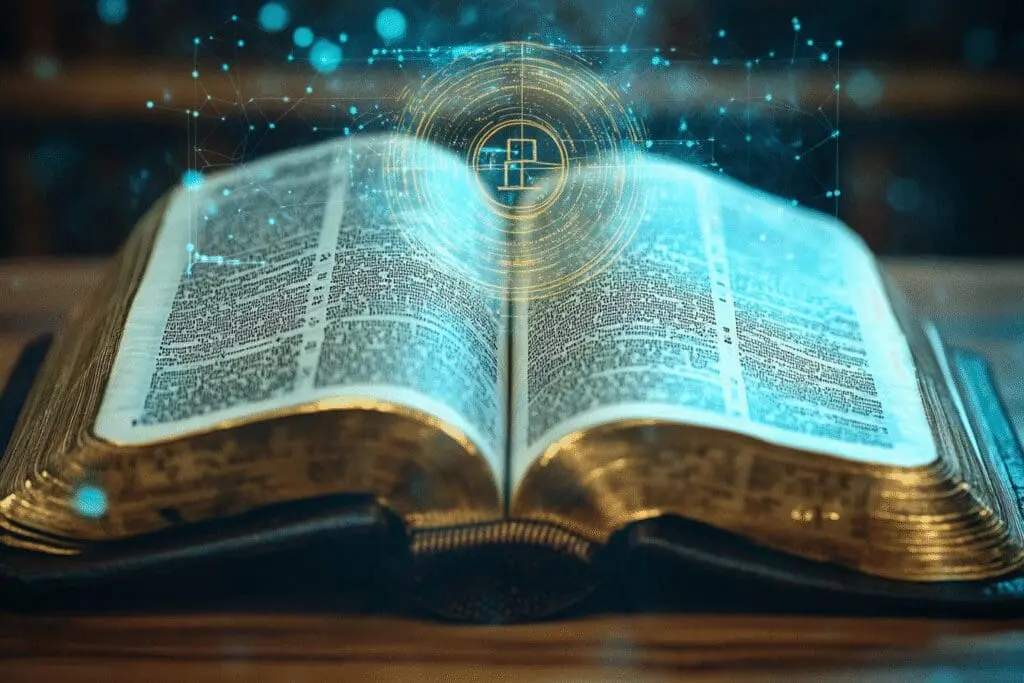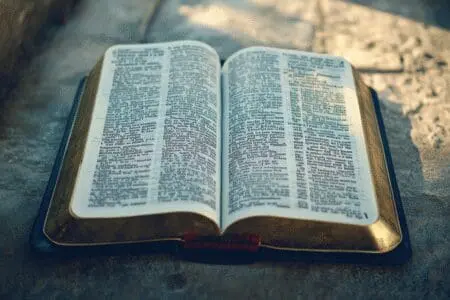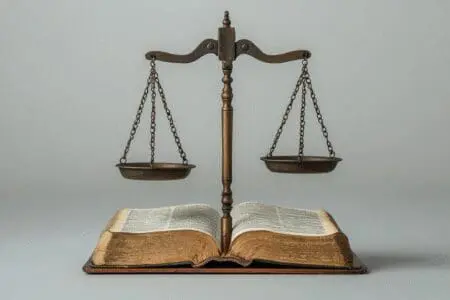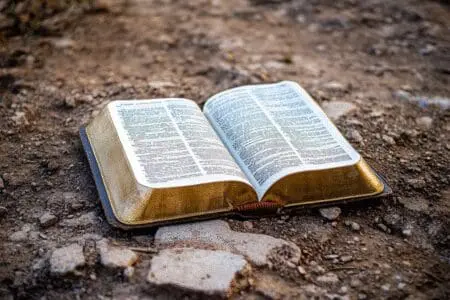You’d think the answer to that question would be a simple “yes” or “no,” right? I certainly did. A while back, I was working on a personal project, a small wooden plaque for my grandfather, and I wanted to engrave a specific verse from the Book of Psalms on it. I picked a translation I grew up with, the New International Version (NIV), and right as I was about to finalize the design, a weird thought hit me: Can I even do this? Is the Bible copyrighted?
It sent me down a rabbit hole of research that was way more complicated than I ever expected. The answer isn’t straightforward. It’s a mix of history, law, and modern publishing practices. It turns out, asking if “the Bible” is copyrighted is like asking if “music” is copyrighted. It depends entirely on which one you’re talking about.
So, let’s unpack what I found. This isn’t dry legal advice from some stuffy lawyer; it’s just what one curious guy figured out, trying to make sure he wasn’t breaking the law while making a gift.
More in Bible Category
How to Convince Someone That the Bible Is True
How Many Times Has the Bible Been Changed
Key Takeaways Right Off the Bat
For those of you who just want the quick and dirty answers, here’s the gist of it:
- Ancient Texts are Public Domain: The original Hebrew, Aramaic, and Greek texts of the Bible are ancient documents. They exist in the public domain, meaning they belong to everyone and no one. You can’t copyright a 2,000-year-old scroll.
- Many Translations ARE Copyrighted: This is the big one. Modern translations like the NIV, ESV, NLT, and The Message are creative, scholarly works. The publishers hold copyrights on them to protect their investment.
- Some Translations are NOT Copyrighted: Older English translations, most famously the King James Version (KJV), are in the public domain in the United States. This is why you see KJV verses everywhere.
- “Fair Use” is Your Friend (Usually): For copyrighted versions, a legal doctrine called “fair use” generally allows you to quote portions for things like sermons, school papers, or personal artwork without needing permission. But there are limits.
So, How Does This Whole Copyright Thing Even Work?
Before we dive deeper into Bibles specifically, it helps to get a handle on what copyright is. I’m not a lawyer, but the basic idea I grasped is this: copyright law is designed to protect the creative work of an author, artist, or creator. It gives them the exclusive right to reproduce, distribute, and display their work.
Think about the last novel you read. The author spent years writing it, and the publisher spent a ton of money editing, printing, and marketing it. Copyright ensures that someone else can’t just scan the book and start selling it as their own. It protects the author’s and publisher’s work.
For a work to be copyrighted, it has to be an original work of authorship fixed in a tangible medium. The key word there is original. You can’t copyright an idea, but you can copyright your specific expression of that idea. This is the crucial point for understanding the Bible copyright situation.
But Isn’t the Bible… Ancient?
Yes, and that’s the starting point. The original manuscripts—the scrolls and codices written in Hebrew, Aramaic, and Greek—are thousands of years old. Copyright law didn’t exist. Even if it did, any copyright would have expired centuries upon centuries ago. These original texts are firmly in the public domain.
So, if you’re a scholar who can read Koine Greek, you could go to the source texts and do whatever you want with them. But for most of us, that’s not very helpful. We rely on translations to read and understand the Bible. And that’s where the legal complications begin.
Why Are Newer Bible Translations Copyrighted?
I always assumed a translation was just a technical process of swapping words from one language to another. But it’s so much more than that. Translating ancient texts is a deeply scholarly and creative act.
Think about it. A team of translators has to:
- Analyze ancient grammar and syntax.
- Debate the meaning of words that have no perfect modern equivalent.
- Consider the tone, style, and literary devices of the original author.
- Reconstruct the text in a new language in a way that is both faithful and readable.
This process can take years, sometimes decades, and involve dozens of highly educated scholars. The final product—whether it’s the English Standard Version (ESV) or the New Living Translation (NLT)—is a new, original literary work. According to U.S. copyright law, this new work is eligible for its own copyright protection.
The publishers who fund these massive projects get the copyright to protect their investment. They’ve spent a lot of money on scholarship, research, and editing, and the copyright allows them to recoup those costs through sales.
Okay, So Which Versions Can I Use Freely?
This was the most practical question for me. If I want to avoid any legal gray areas, what are my options? The answer, at least in the United States, is pretty clear.
The most famous public domain Bible is the King James Version (KJV). The original KJV was completed in 1611, long before modern copyright existed. It’s been in the public domain in the US for a very long time. This is why the KJV is so widely quoted and reprinted by countless publishers.
Other public domain versions in the US include:
- The World English Bible (WEB)
- The American Standard Version (ASV) of 1901
- Young’s Literal Translation (YLT)
- The Darby Translation
If you use text from any of these versions, you are generally on safe ground. You can print them, post them online, put them on products—you name it.
A quick note about the KJV: Interestingly, due to a unique legal quirk called “letters patent,” the printing rights for the KJV in the United Kingdom are still restricted and held by the Crown. But if you’re in the USA, you don’t need to worry about that.
Can I Quote a Copyrighted Bible Without Getting Sued?
This is the million-dollar question, isn’t it? Let’s say your church uses the NIV and you want to quote it on your blog, or you’re leading a small group study using The Message. Are you breaking the law?
Probably not. This is where the legal concept of “Fair Use” comes into play.
Fair use is a doctrine in United States law that permits limited use of copyrighted material without having to first acquire permission from the copyright holder. It’s the reason critics can review movies, teachers can share articles with students, and artists can create parodies.
According to the official U.S. Copyright Office, courts look at four factors to determine if something qualifies as fair use:
- The purpose and character of the use: Is it for commercial use, or for non-profit educational, commentary, or religious purposes? Non-commercial and educational uses are more likely to be considered fair.
- The nature of the copyrighted work: Using factual work is more likely fair use than using highly creative work. (This factor is a bit tricky with the Bible).
- The amount and substantiality of the portion used: How much of the original work did you use? Quoting a few verses is very different from reprinting an entire book.
- The effect of the use on the potential market for the work: Does your use of the text hurt the publisher’s ability to sell their Bible? If you post so much of it that people don’t need to buy their own copy, that’s a problem.
What Do the Publishers Themselves Say?
Thankfully, we don’t have to guess. Most publishers of modern Bible translations have very clear policies that outline what they consider acceptable use. They generally want people to engage with their translations, so they are often quite generous.
I went and looked up the policies for a few of the major ones. Here’s a general summary of what I found:
- New International Version (NIV): Zondervan, the publisher, allows you to quote up to 500 verses without express written permission, as long as the verses quoted do not amount to a complete book of the Bible or account for 25% or more of the total text of the work in which they are quoted. There are also specific rules about including the proper copyright notice.
- English Standard Version (ESV): Crossway’s policy is similar. You can quote up to 1,000 verses or 50% of any one book for non-commercial purposes without permission. They just require you to include the initials (ESV) after the citation.
- New Living Translation (NLT): Tyndale House Publishers also has a generous policy for quoting scripture in church bulletins, sermons, or other non-commercial contexts.
The bottom line is this: always check the publisher’s specific policy. They usually have a “Permissions” or “Copyright” page on their website that spells everything out. For my little plaque project, quoting one verse from the NIV was perfectly fine and fell well within Zondervan’s guidelines. All I needed to do was add a small “(NIV)” at the end.
What If I’m Making Something to Sell?
This is where things get much stricter. The “fair use” and publisher policies I mentioned are almost always for non-commercial use (meaning, you aren’t making money from it).
If you plan to create a product for sale—whether it’s artwork, a book, a coffee mug, or a t-shirt—the rules change.
- Public Domain Versions: Your safest bet is to stick with a public domain version like the KJV. Since no one owns the copyright, you can use the text freely on commercial products. This is why you see so many products with KJV verses.
- Copyrighted Versions: If you want to use a modern translation on a commercial product, you absolutely must get permission from the publisher. This usually involves applying for a license and often paying a fee or royalty. Using their text without a license is copyright infringement, and publishers have a right to protect their work.
I once had a friend who wanted to launch a line of greeting cards. She loved the poetic language of The Message translation. She found out very quickly that she would need to contact the publisher and secure a formal licensing agreement before she could print a single card.
What About Paraphrasing? Can’t I Just Change a Few Words?
This is a common misconception. Simply changing a few words in a sentence from a copyrighted work isn’t enough to avoid infringement. This is called creating a “derivative work,” and the right to create derivative works is one of the exclusive rights of the copyright holder.
To be safe, your paraphrase would have to be so different from the original that it no longer reflects the unique translation choices and creative expression of the copyrighted version. It’s a legal gray area, and for most people, it’s not a line worth trying to walk.
If you’re inspired by a verse from the ESV, you’re better off either quoting it directly and following their fair use policy, or reading the verse, understanding its meaning, and then expressing that meaning entirely in your own words, without borrowing the specific phrasing of the translation.
Does This Copyright Stuff Change If I’m Not in the US?
For the most part, the principles are similar across many countries, but the specifics can vary. Most industrialized nations have signed international copyright agreements, like the Berne Convention, which establish a system of mutual copyright protection.
This means that a work copyrighted in the United States is generally protected in Canada, the UK, Australia, and so on. However, the exact details—like the duration of a copyright or the specifics of fair use (often called “fair dealing” in other countries)—can be different.
For example, I mentioned that the KJV is in the public domain in the US. In the UK, it remains under perpetual Crown copyright. This is a rare and specific exception, but it highlights that you should always check the laws in your specific country. If you live outside the US and plan to use biblical texts extensively, it would be wise to research the public domain status of various translations in your own nation. For a deep dive into the legal framework, Cornell Law School’s Legal Information Institute provides an excellent resource on U.S. copyright law that forms the basis for these principles.
So, where does that leave us? My journey started with a simple question about a gift for my grandfather and ended with a new appreciation for the incredible amount of work that goes into creating a Bible translation.
The Bible itself—the divine story, the ancient message—belongs to humanity. But the specific, painstaking, and scholarly English rendering of that message in a modern translation is a work of art and literature protected by law. Understanding that distinction is the key to navigating this topic with both respect and confidence.
Frequently Asked Questions – Is the Bible Copyrighted

When should I seek permission to use Bible verses?
You should seek permission if you plan to use a large number of verses, use the verses commercially, or include them in a product you sell. When in doubt, it’s best to contact the copyright holder to ensure compliance.
Can I quote Bible verses in my work without permission?
You can generally quote Bible verses under the law of Fair Use, especially if you use a small portion, like a few verses, for purposes such as teaching, commentary, or personal study. Always consider the amount of text used and the context to ensure fair use.
Do modern Bible translations have copyright protection?
Yes, modern translations such as the NIV, ESV, and NLT are protected by copyright because they involve significant new work by translator teams. These copyrights help protect their efforts and ensure the accuracy of their translations.
Are old translations of the Bible, like the King James Version, copyrighted?
Old translations such as the King James Version (1611) are generally in the public domain in the United States, meaning you can freely copy and use them. However, copyright laws may differ in other countries, such as the UK, where the KJV might still be protected.
Is the Bible in the public domain or copyrighted?
The original texts of the Bible in Hebrew, Aramaic, and Greek are in the public domain, meaning they are free for everyone to use. However, modern translations and specific editions may be copyrighted, depending on their age and the work involved in creating them.




